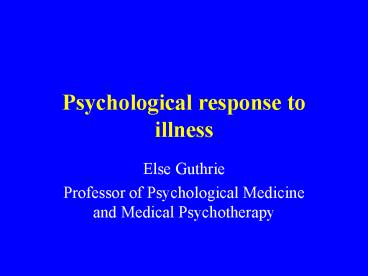Psychological response to illness - PowerPoint PPT Presentation
1 / 30
Title:
Psychological response to illness
Description:
Stressfulness dependent upon an individual's perception of illness ... Agoraphobia. Generalised anxiety disorder. Specific phobia. Social phobia ... – PowerPoint PPT presentation
Number of Views:1584
Avg rating:3.0/5.0
Title: Psychological response to illness
1
Psychological response to illness
- Else Guthrie
- Professor of Psychological Medicine and Medical
Psychotherapy
2
Plan
- Stress associated with illness
- Common coping strategies
- Individual factors which shape peoples response
to illness - Illness related factors
- Psychiatric disorders in the medically ill
3
Stress associated with illness
- Major health problems are stressful
- Stressfulness dependent upon an individuals
perception of illness - No clear separation between normal and
abnormal psychological reaction to illness
4
Eliciting beliefs
- Do you have any worries or concerns about your
illness? - Is there anything youre not sure of?
- Is there anything that youre really worried
about?
5
Hospitalisation
- Privacy
- Independence
- Social support
- Invasive and unpleasant medical procedures
- Many different people involved with one persons
care - Abstinence from smoking and alcohol
6
Coping strategies
- Seeking information
- Seeking practical and social support
- Learning new skills
- Developing new interests
- Helping others
7
Emotion focused coping
- Sharing feelings and concerns about illness
- Expressing anger or other distressing feelings in
an appropriate way - Managing loss
- Gaining emotional support
- Giving up idealised hopes of recovery
8
Less helpful coping strategies
- Hoping the condition will just disappear
- Denial
- Obsessively focusing on minute details of the
disorder - Seeking others to blame
9
Individual Factors
- Personality traits (e.g. tendency to worry about
illness) - Prior experience of illness within a family
- An individuals psychological state at the time
of the illness - Previous experience of trauma, or a neglected or
abusive childhood
10
Identifying personal factors
- What was this person like before the illness?
- Is there a history of serious illness in the
family? - Was this person suffering from psychiatric
illness when the physical condition began? - Is there any evidence of a difficult or abusive
childhood? - Any other major problems?
11
Factors related to illness
- Acute
- Chronic
- Life threatening
- Terminal
12
Psychological Adjustment to Physical Illness
Emotional distress
6 months
Time
13
Carers
- Demands upon family members may be onerous
- Elevated rates of depression in carers
- Patients with cancer or stroke
- Lead from government (Caring about Carers, 1999).
14
Adherence
- Entering into a continuing treatment programme
- Keeping referral and follow-up
- Taking medication correctly
- Following recommended lifestyle changes
15
Psychiatric problems in the medically ill
16
Psychiatric problems
- Depressive disorders
- Anxiety states
- Sexual problems
- Alcohol problems
17
Depressive symptoms
- Mood and motivation
- Persistent low mood
- Diminished interest or pleasure
- Social withdrawal
- Loss of energy
18
Depressive symptoms
- Cognitive changes
- Depressive thoughts,
- Worthlessness,
- Self blame
- Suicidal wishes,
- Hopelessness
19
Depressive Symptoms
- Biological symptoms
- Poor appetite,
- Weight loss,
- Sleep disturbance,
- Poor concentration,
- Decreased sex drive,
- Retardation or agitation
20
Prevalence of psychiatric disorder in different
organic conditions (bars show the highest and
lowest recorded rates)
Per cent
21
Prospective Longitudinal Cohort Study of Anxiety
and Depression in Medical In-Patients
Acute medical in-patients
Follow-up 5 months later
(n218)
(n263)
Psychiatric diagnosis Health Status-SF-36 Duke
Severity of Illness Scale Karnofsky Performance
Status Scale Health care costs
Creed et al, Psychosomatics 43302-309
22
Prevalence of psychiatric disorder
- 27 of acute medical in-patients had diagnosable
depressive or anxiety disorders - A further 41 had sub-threshold disorders
23
Mean SF36 scores for physical dimensions at 5
months follow-up, adjusted for severity of illness
24
Main findings
- Patients with depression and anxiety had
significantly lower quality of life than controls - Recovery from depression following discharge was
very unlikely - Costs incurred by patients who were depressed
were higher than controls, but there was no
effect on length of stay
25
Mean HRQOL in CD by Depression
Irvine et al 2002
26
Anxiety states
- Panic disorder
- Agoraphobia
- Generalised anxiety disorder
- Specific phobia
- Social phobia
- Obsessional compulsive disorder
- Post-traumatic stress disorder
27
Sexual problems
- Common
- 35-40 diabetic males report sexual problems
- Caused by
- the condition itself
- Effects of drugs and other physical treatments
- Psychological sequelae of the condition
- Co-existing psychiatric disorder
28
Sexual problems
- Enquiry
- Know something about the patient and their
circumstances before asking - Detailed enquiry not necessary
- One or two relevant screening questions
- Enquire in a matter of fact but sensitive way
29
Summary
- Major health problems cause worry and distress.
- The stressfulness of an illness depends upon the
patients perception of the illness - People react and cope in different ways.
- Most people, given time, develop adaptive ways to
manage illness
30
Summary
- Psychiatric disorders are twice as common in
medical patients than in the general population - Approximately one quarter of patients admitted to
hospital develop depressive disorders which are
severe enough to require medical treatment - Psychiatric disorder in the physically ill is
often missed - If untreated, depression results in increased
morbidity, poor physical function and increased
health care costs. - Improved psychological medicine services for
patients whilst in hospital would ensure better
detection and treatment of such problems.































